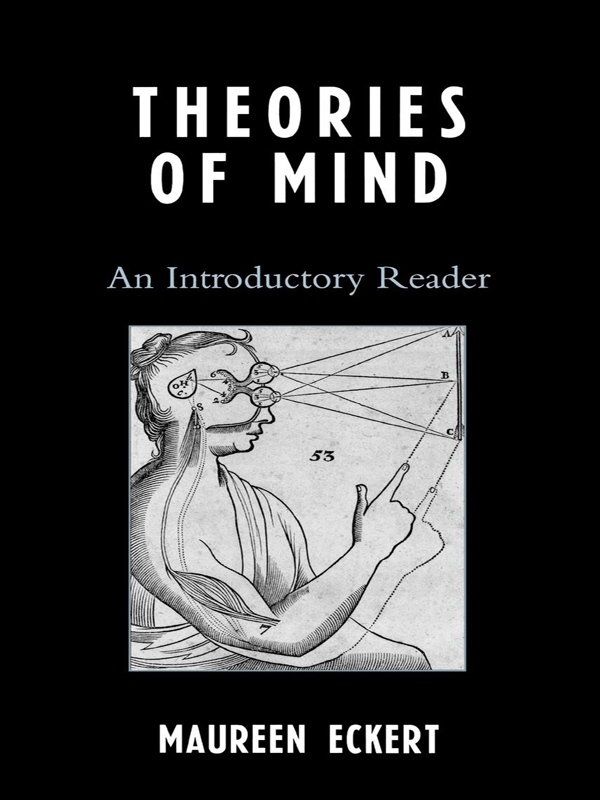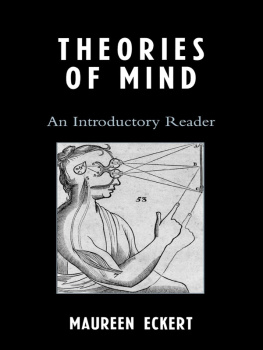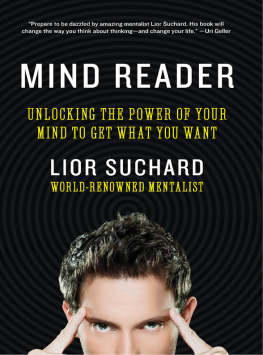Eckert - Theories of Mind: An Introductory Reader
Here you can read online Eckert - Theories of Mind: An Introductory Reader full text of the book (entire story) in english for free. Download pdf and epub, get meaning, cover and reviews about this ebook. City: Lanham, Md., year: 2006, publisher: Rowman & Littlefield Publishers, genre: Religion. Description of the work, (preface) as well as reviews are available. Best literature library LitArk.com created for fans of good reading and offers a wide selection of genres:
Romance novel
Science fiction
Adventure
Detective
Science
History
Home and family
Prose
Art
Politics
Computer
Non-fiction
Religion
Business
Children
Humor
Choose a favorite category and find really read worthwhile books. Enjoy immersion in the world of imagination, feel the emotions of the characters or learn something new for yourself, make an fascinating discovery.
Theories of Mind: An Introductory Reader: summary, description and annotation
We offer to read an annotation, description, summary or preface (depends on what the author of the book "Theories of Mind: An Introductory Reader" wrote himself). If you haven't found the necessary information about the book — write in the comments, we will try to find it.
Eckert: author's other books
Who wrote Theories of Mind: An Introductory Reader? Find out the surname, the name of the author of the book and a list of all author's works by series.
Theories of Mind: An Introductory Reader — read online for free the complete book (whole text) full work
Below is the text of the book, divided by pages. System saving the place of the last page read, allows you to conveniently read the book "Theories of Mind: An Introductory Reader" online for free, without having to search again every time where you left off. Put a bookmark, and you can go to the page where you finished reading at any time.
Font size:
Interval:
Bookmark:

I am grateful to the Office of the Provost, University of Massachusetts at Dartmouth, for support of this project. Colleagues lent their ideas and support throughout various stages, especially Pete Mandik, Steven Cahn, Eric Steinhart, and Catherine Villanueva Gardner. I wish to thank my editor, Eve DeVaro, and her assistants, Tessa Fallon and Emily Ross, for their constant, invaluable assistance, and my mom, Agnes, for her generous help in typing readings for the manuscript.
Maureen Eckert
University of Massachusetts, Dartmouth
Maureen Eckert is an assistant professor of philosophy at the University of Massachusetts, Dartmouth. Her interests include ancient Greek philosophy, philosophy of mind, and metaphysics. Textbooks that she has co-edited include Knowledge and Reality: Classic and Contemporary Readings , with Steven M. Cahn and Robert Buckley (2003), and Philosophical Horizons: Introductory Readings , with Steven M. Cahn (2005). She lives in Providence, Rhode Island, where she enjoys creating and collecting art in her spare time.
Ren Descartes (1596-1650) was a philosopher, mathematician, and scientist, widely considered a founder of modern philosophy. His most famous work, Meditations on First Philosophy (1641), sought to integrate all of the sciences and provide a foundation for all knowledge. Other works of his include his Optics, Meteorology, and Geometry and its preface, Discourse on the Method of Rightly Conducting the Reason and Seeking Truth in the Sciences (1637) and Principles of Philosophy (1644) from which our selections are taken.
Gilbert Ryle (1900-1976), British philosopher, principally known for his critique of Cartesian dualism, for which he coined the phrase the ghost in the machine. He referred to some of his ideas as behaviourism. A capable linguist, he was recruited to intelligence work during World War II, after which he became Wayneflete Professor of Metaphysical Philosophy at Oxford and published his principal work, The Concept of Mind in 1949. Other books include Platos Progress and Dilemmas , a collection of shorter pieces. He was editor of the philosophical journal Mind from 1947 to 1971.
Jerry A. Fodor is a professor of philosophy at Rutgers University. He has published numerous articles on the philosophy of mind and cognitive science. Some important books he has written include The Modularity of Mind: An Essay on Faculty Psychology (1983), The Mind Doesnt Work That Way; The Scope and Limits of Computational Psychology (2000), and The Language of Thought (1975) from which our selection comes.
See also, chapter 7, The Mind Body Problem.
J. J. C. Smart is Emeritus Professor of Philosophy at the Australian National University and Honorary Research Fellow at Monash University. His works include papers on physicalism as well as other areas of philosophical inquiry such as ethics and philosophy of religion. A published collection of his articles is Essays Metaphysical and Moral (1987).
Alan M. Turing (1912-1954), British mathematician, logician, and cryptographer, is considered one of the fathers of modern computer science. His Turing Test contributed to the debate regarding artificial intelligencewhether it will ever be possible to say that a machine is conscious and can think. During World War II, Turing worked at Bletchley Park, Britains codebreaking center and was for a time responsible for German Naval crypt-analysis. He devised techniques for breaking German codes, including the Enigma code. After the war, at the University of Manchester he worked largely on software, on the Manchester Mark I, then emerging as one of the worlds earliest true computers.
David Lewis (1941-2001) was a professor of philosophy at Princeton University. He worked in many areas of philosophy, including philosophy of mind, language, and metaphysics. Famous works of his include, Counterfactuals (1973), On the Plurality of Worlds (1986), and several volumes of collected papers including Philosophical Papers , Vol. 1 (1983).
Ned Block is Silver Professor of Philosophy and Psychology at New York University. He is the author of numerous papers in the areas of philosophy of mind and consciousness, psychology, and cognitive science. He is one of the editors of The Nature of Consciousness: Philosophical Debates (1997).
Frank Jackson is Distinguished Professor at the Australian National University. His research includes the areas of Philosophical Logic, Cognitive Science, Epistemology and Metaphysics, and Meta-Ethics. His works include Perception: A Representative Theory (1977) and his collected papers are reprinted in Mind, Method, and Conditionals: Selected Essays (1998).
Paul Churchland is professor of philosophy at the University of California, San Diego. His research spans the areas of philosophy of mind, artificial intelligence and cognitive neurobiology, epistemology, and perception. His books include The Engine of Reason, The Seat of the Soul: A Philosophical Journey into the Brain (1995) and A Neurocomputational Perspective: The Nature of Mind and the Structure of Science (1989), as well as Matter and Consciousness (1984; second edition 1988) which provides us with our reading selection.
. Daniel Dennett is University Professor of Philosophy, Austin B. Fletcher Professor and Director of the Center for Cognitive Studies at Tufts University. He is author of numerous papers in the areas of philosophy of mind, consciousness, and cognitive science and major works include The Intentional Stance (1989), Consciousness Explained (1991), and Freedom Evolves (2003).
Andy Clark is professor of philosophy and director of the Cognitive Science Program at Indiana University, Bloomington. His books include Being There: Putting Brain, Body and World Together Again (1997) and Mindware: An Introduction to the Philosophy of Cognitive Science (2000).
John Searle is Mills Professor of the Philosophy of Mind and Language at the University of California, Berkeley. His works include Minds, Brains and Science (1985), The Rediscovery of the Mind (1992), The Construction of Social Reality (1995), and Mind (2004).
Patricia Churchland is University Professor of Philosophy at the University of California, San Diego. Her works include Neurophilosophy: Toward a Unified Science of the Mind-Brain (1986), The Computational Brain, with T. J. Sejnowski (1992), and On the Contrary, with Paul M. Churchland (1998).
Thomas Nagel is Fiorello La Guardia Professor of Law, University Professor, and professor of philosophy at New York University. His works include Mortal Questions (1979), The View From Nowhere (1986), and What Does It All Mean? (1987).
Keith Gunderson is professor of philosophy at the University of Minnesota. He is the author of Mentality and Machines, 2nd ed. (1985).
David M. Armstrong is Emeritus Professor of Philosophy, University of Sydney, 1992-present. He is the author of numerous papers and books on the philosophy of mind and metaphysics, including The Nature of Mind (1981) and Universals: an Opinionated Introduction (1989).
David Chalmers is professor of philosophy, director of the Centre for Consciousness, and an ARC Federation Fellow at the Australian National University. He is author of the book, The Conscious Mind: In Search of a Fundamental Theory (1996).
Barbara Montero is assistant professor of philosophy at the College of Staten Island of the City University of New York. Her research includes the metaphysics of the mind and proprioception.
Font size:
Interval:
Bookmark:
Similar books «Theories of Mind: An Introductory Reader»
Look at similar books to Theories of Mind: An Introductory Reader. We have selected literature similar in name and meaning in the hope of providing readers with more options to find new, interesting, not yet read works.
Discussion, reviews of the book Theories of Mind: An Introductory Reader and just readers' own opinions. Leave your comments, write what you think about the work, its meaning or the main characters. Specify what exactly you liked and what you didn't like, and why you think so.











